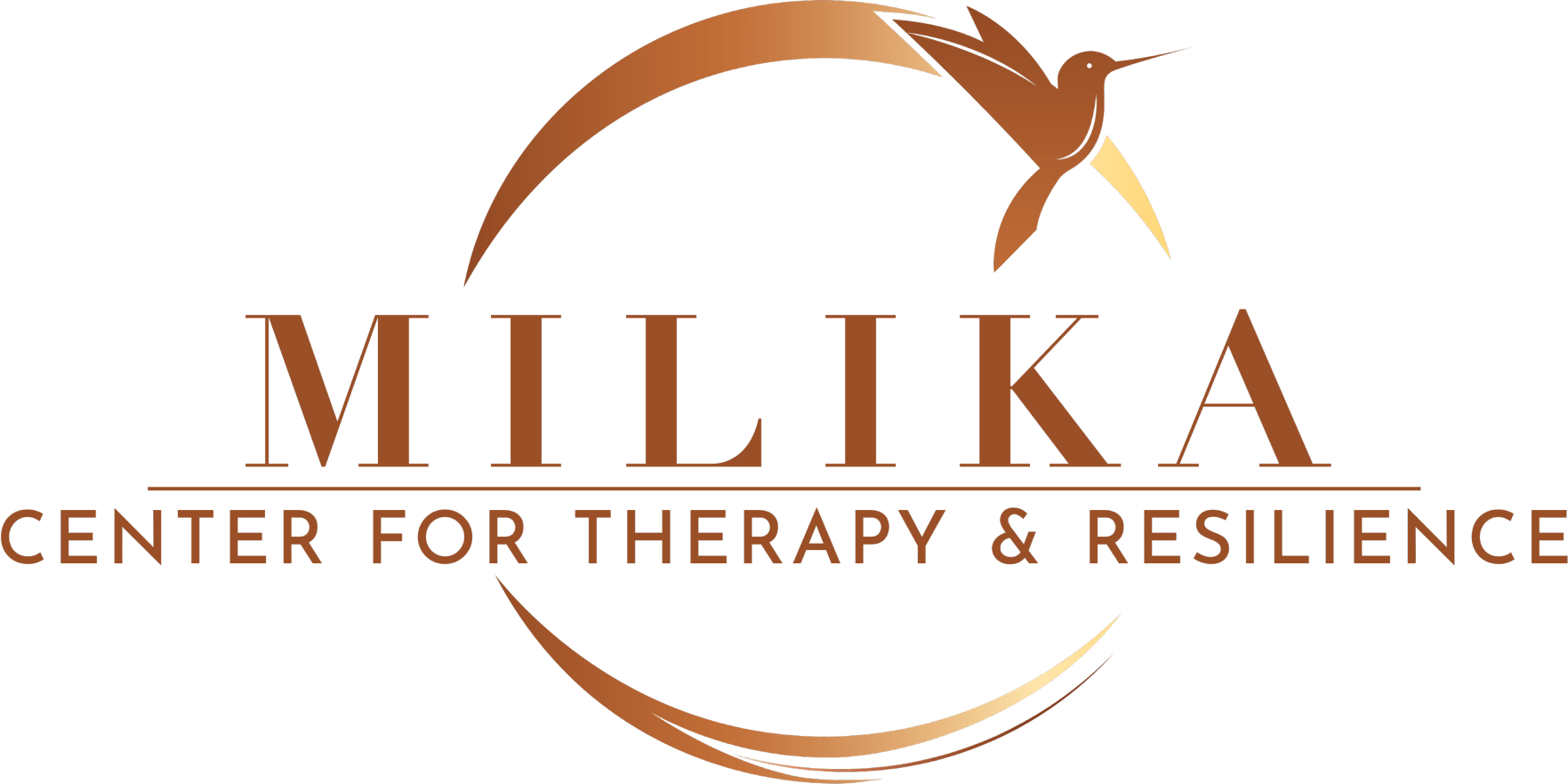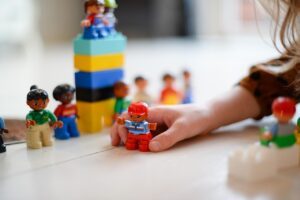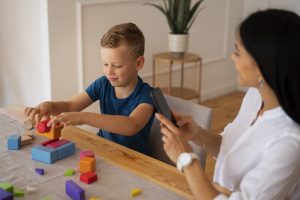What Is Play Therapy and How Can It Help Your Child
Key Takeaways:
- Play is a child’s natural language, and therapy that uses it can help kids express emotions, build resilience, and process life experiences in a safe, developmentally appropriate way.
- Play therapy can help with a wide range of challenges—including anxiety, grief, behavioral issues, bullying, and family transitions—by strengthening emotional regulation, communication, and self-esteem.
- At MILIKA, child play therapy is trauma-informed, culturally responsive, and deeply collaborative with caregivers, offering personalized support that honors each child’s unique needs and background.
——————————————————————————————————————————
When children are struggling—whether with anxiety, big emotions, changes at home, or challenges at school—it can be hard to know how to help. As a parent, you may notice their behavior shifting, but when you ask what’s wrong, you’re met with silence or “I don’t know.” That’s because young children often don’t have the words to express what they’re feeling inside.
At Milika Center for Therapy & Resilience, we understand that children communicate through play. It’s their natural language—the way they make sense of their world, process experiences, and express emotions that feel too big to put into words. Play therapy creates a safe and supportive space where your child can explore their internal world, all through the tools they already use every day: imagination, creativity, and connection.
In this article, we’ll walk you through what play therapy is, how it works, and why it can be such a powerful tool to support your child’s emotional growth and healing.
What Is Play Therapy—and Why It Matters?
Play therapy is a developmentally appropriate and structured approach to therapy for children that uses play to help them express their feelings and process life experiences.
In child play therapy, a trained therapist uses evidence-based techniques to gently guide emotional growth through activities your child already engages in every day. It’s more than just “playing”—it’s a research-backed approach that supports mental health for kids in a way that feels safe and familiar.
Through play therapy, children can:
- Explore emotions that they may not be able to express with words.
- Build emotional regulation and problem-solving skills.
- Process trauma, stress, or big life transitions.
- Improve communication and confidence.
- Strengthen resilience and self-esteem.
What You Might See in a Play Therapy Session
Depending on your child’s age and needs, a session with a child therapist might include:
- Role-playing with figurines or puppets.
- Drawing, painting, or other creative art.
- Sand tray or sensory play.
- Therapeutic games or storytelling.
- Mindfulness or calming strategies through play.
Whether your child is navigating anxiety, grief, school stress, family transitions, or behavioral challenges, child therapy services rooted in play can gently support healing and emotional development in children.
What Issues Can Play Therapy Help With?
Children may not always have the words to say they’re overwhelmed, but changes in behavior, mood, or relationships often tell the story. Whether your child is withdrawing, acting out, or just not quite themselves, play therapy can offer a safe space to explore what’s beneath the surface.
Play therapy for kids can help with:
- Anxiety and fear, including separation anxiety, school stress, phobias, and general worries.
- Trauma and grief. Supporting children in processing painful experiences like loss, accidents, or witnessing violence.
- Behavioral challenges. Helping kids understand and manage impulsivity, aggression, meltdowns, or defiance.
- Social and peer difficulties. Addressing friendship struggles, bullying, or challenges with communication and boundaries.
- Life transitions, such as divorce, a new sibling, moving homes or schools, or changes in family dynamics.
- Chronic illness or medical trauma. Providing a safe outlet to process medical experiences, procedures, or long-term health conditions.
No concern is too small. If something’s affecting your child’s wellbeing, therapy for children through play can help them feel more understood, more in control, and more themselves again.
How Parents Are Involved
We know that children heal best when the adults in their lives feel informed, supported, and empowered to reinforce progress outside of therapy. As a parent or caregiver, you play a crucial role in your child’s growth and emotional well-being. That’s why we approach child therapy services as a collaborative process, where your insight, questions, and involvement are always welcome. This might include:
- Parent-only sessions to offer guidance, emotional support, and practical tools.
- Joint sessions with you and your child to strengthen the connection and apply skills together.
- Ongoing check-ins to align on therapy goals and track progress.
- Sharing updates on progress and goals so you feel informed and empowered to support growth outside of the therapy room.
- Psychoeducation around emotional development, behavior, and how to respond to challenges at home.
Because play therapy for kids often involves emotions that show up in daily life—at school, at home, or with peers—this kind of collaboration helps reinforce the progress your child is making.
How We Use Play Therapy at MILIKA
At MILIKA, we don’t believe in one-size-fits-all solutions—especially when it comes to kids. Every child who walks through our doors brings their own story, strengths, and struggles. That’s why our approach to play therapy is always personalized, grounded in trust, and built on deep respect for each child’s unique experience.
Our sessions are:
- Trauma-informed and relationally grounded. We create a space where children feel safe, seen, and understood because healing begins with relationships. We attune to each child’s pace, emotional needs, and cues, never rushing the process.
- Culturally responsive and inclusive. We honor each child’s background, identity, and lived experiences. Our therapists are mindful of how culture, family values, and social environments shape the way a child expresses themselves and interacts with the world.
- Collaborate with caregivers. You know your child best. We partner with you to share insights, celebrate progress, and offer tools that support growth at home and beyond.
In the therapy room, play becomes more than an activity—it becomes a bridge. Whether a child is reenacting a tough experience with figurines, drawing out a fear, or building a story in their own storybook, our therapists are trained to notice what’s being communicated and respond with care, curiosity, and clinical expertise.
We believe that emotional safety is the foundation of any meaningful change. When a child feels secure and accepted, they’re more able to take risks, share feelings, and build new skills. Over time, this trust helps children grow into more confident, connected, and resilient versions of themselves.
Ready to Support Your Child’s Emotional Growth?
If your child is struggling with big feelings, behavior changes, or tough transitions, you don’t have to figure it out alone. At MILIKA, we’re here to walk alongside you—with compassion, curiosity, and the tools to help your child thrive.
Play therapy can be a powerful way to help your child feel safe, understood, and supported. If you’re ready to learn more or see if child play therapy is the right fit for your family, we invite you to reach out.
Book a free consultation or explore our child therapy services in Los Angeles. We’re here to help your child reconnect with their resilience—one step, and one session, at a time.
Frequently Asked Questions (FAQs)
What age is play therapy appropriate?
Play therapy is most commonly used with children between the ages of 3 and 12, but it can benefit kids of any age depending on their developmental stage and emotional needs. At MILIKA, we recognize that emotional expression doesn’t always follow a specific age range. Our therapists create each session to meet your child where they are, using developmentally appropriate tools to support healing, growth, and connection.
How long does play therapy take to work?
There really is no firm timeline; every child is different. Some may show progress in just a few months, while others benefit from longer-term support. Factors such as the nature of the challenges, your child’s temperament, and the consistency of the sessions all play a role. We check in regularly with caregivers and adjust the plan as needed.
What if my child just plays and doesn’t talk?
That’s okay—and completely expected. In play therapy, the play is the communication. Even if your child isn’t verbalizing what’s going on, they’re still expressing emotions and working through experiences in powerful, symbolic ways. Our therapists are trained to observe and respond with care, attunement, and intention.
Can play therapy help with school-related stress or bullying?
Yes. Play therapy can be a helpful way for children to process school-related anxiety, bullying, academic pressure, or social challenges. It provides a safe space for kids to explore their feelings, practice coping strategies, and rebuild confidence—all of which can lead to positive changes in their school experience.











